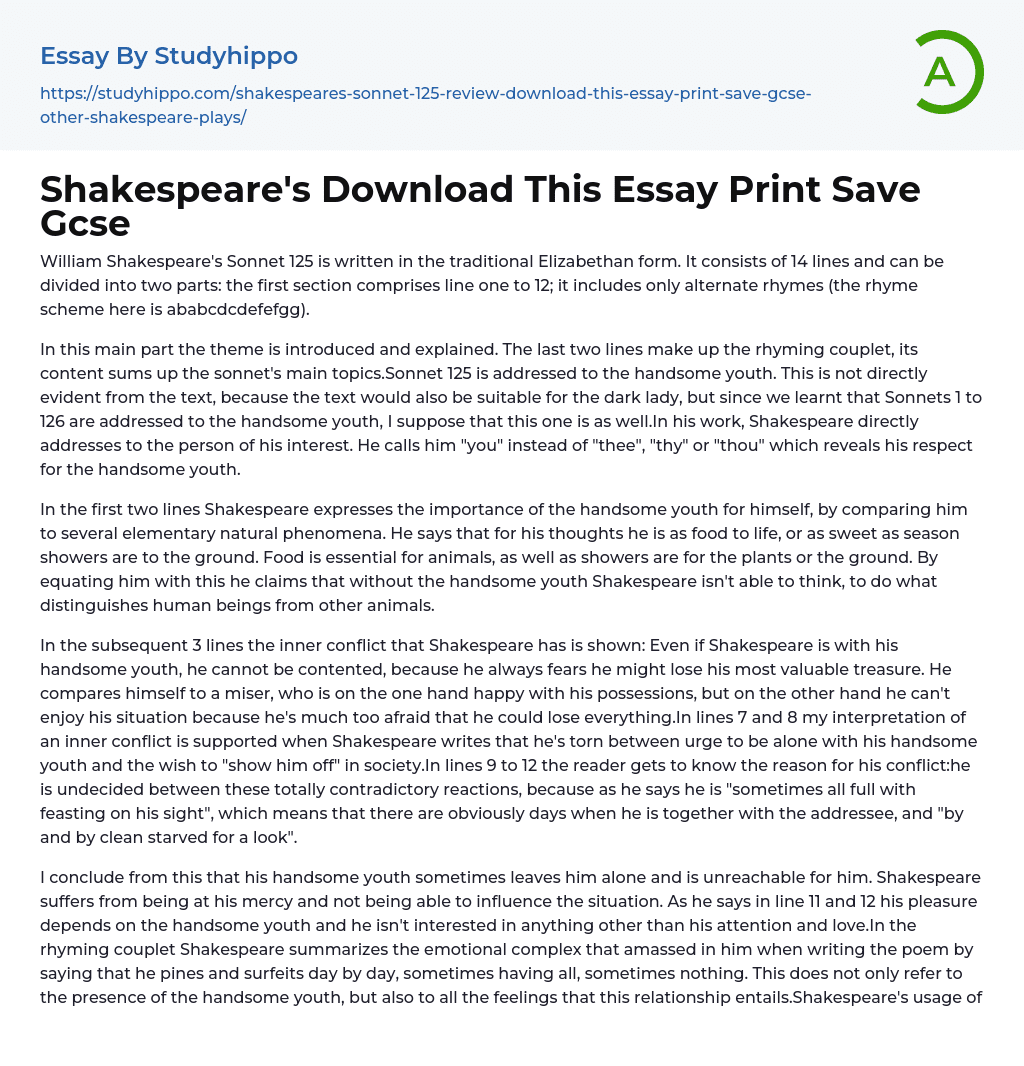There is a traditional Elizabethan form in William Shakespeare's Sonnet 125. It is comprised of 14 lines and there are two parts to this sonnet. The first section, consisting of lines one through 12, only includes alternate rhymes. The rhyme pattern for this section follows ababcdcdefefgg.
Introducing and explaining the main theme of Sonnet 125, the rhyming couplet at the end summarizes the poem's main topics. Addressing the handsome youth directly, Shakespeare uses "you" instead of "thee", "thy" or "thou", demonstrating his respect for the subject. While textually suitable for the dark lady as well, Sonnet 125's placement within Sonnets 1 to 126 indicates that it is addressed to the handsome youth.
Shakespeare emphasizes the significance of the handsome youth by comparing him to basic natural forces in the initial two lines. H
...e states that, to his thoughts, the youth is as vital as food is to life and as delightful as seasonal rains are to the earth. Shakespeare suggests that just as animals require food and the ground longs for rain, without the handsome youth, he is unable to think and perform activities that differentiate human beings from other animals.
Shakespeare's inner conflict is revealed in the subsequent three lines, wherein he expresses his fear of losing his most valuable treasure even in the company of his handsome youth. He compares himself to a miser who can't enjoy his possessions due to the constant fear of losing them. In lines 7 and 8, Shakespeare expresses being torn between his desire to be alone with the youth and the urge to showcase him in society, further affirming my interpretation of his inner conflict. The reader learns that hi
indecision stems from conflicting reactions, as he feels "feasting on his sight" on some days, while being "clean starved for a look" on others in lines 9 to 12.
It can be inferred that Shakespeare is sometimes left alone and unable to reach his attractive youth. Shakespeare feels powerless in this situation and admits in lines 11 and 12 that his happiness relies solely on the attention and love of the handsome youth. The final rhyming couplet displays the emotional complexity involved in this relationship, as Shakespeare expresses his alternating feelings of abundance and lack. The use of stylistic devices in the poem enhances the reader's understanding of Shakespeare's emotional life and demonstrates that his feelings are not only tied to the presence of the handsome youth but also to their entire relationship.
Throughout the text, Shakespeare employs similes to compare his striking young appearance with natural phenomena in lines 1, 2, 4, and 5. These similes are helpful for visualization and comprehension. Additionally, various antitheses, such as "Possessing or pursuing" in line 11 and "pine and surfeit" in line 13, contribute to the notion of inner conflict within Shakespeare. An anaphora in lines 5 and 7 further emphasizes this idea with repeated use of the word "Now..."
Shakespeare exhibits contradiction with the word "then" on line 8, showing uncertainty about his emotions and life. His confusion is not uncommon as he describes the handsome youth as the most important person in his life in Sonnet 125, yet shifts attention to the Dark Lady just two sonnets later, making her the subject of his work. Shakespeare's emotional life is disorganized and in turmoil.
Despite this,
I think that the author effectively involves the reader in his thought process.
- Book Summary essays
- Metaphor essays
- Reader essays
- Rhyme essays
- Literary devices essays
- Villain essays
- Books essays
- Genre essays
- Literary Criticism essays
- Writer essays
- Protagonist essays
- Simile essays
- Poem essays
- Book Report essays
- Book Review essays
- Greek Mythology essays
- Plot essays
- Tragic Hero essays
- Coming of Age essays
- Play essays
- Rhetoric essays
- Rhetorical Question essays
- Translation essays
- Understanding essays
- Reason essays
- Character essays
- Letter essays
- American Literature essays
- Literature Review essays
- Utopia essays
- Poetry Analysis essays
- Dante's Inferno essays
- Between The World and Me essays
- Incidents in The Life of a Slave Girl essays
- Flowers for Algernon essays
- Myth essays
- Everyday Use essays
- Boo Radley essays
- Genesis essays
- Richard iii essays
- Alice in Wonderland essays
- On the road essays
- Ozymandias essays
- The Nightingale essays
- Holden Caulfield essays
- Animal Farm essays
- 1984 essays
- A Hanging essays
- Shooting An Elephant essays
- A Tale Of Two Cities essays




